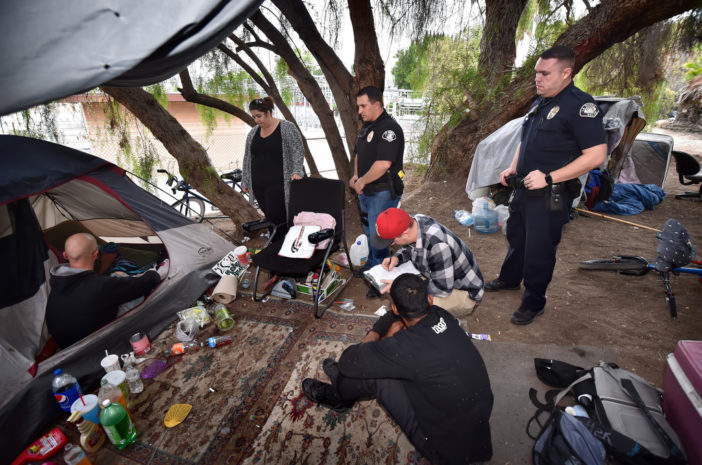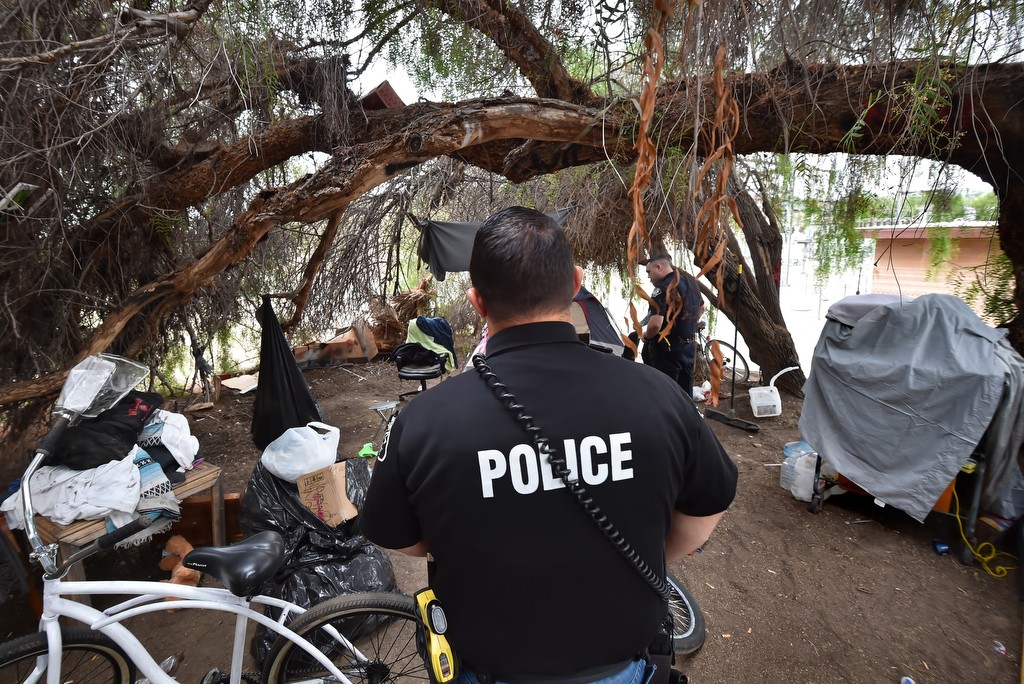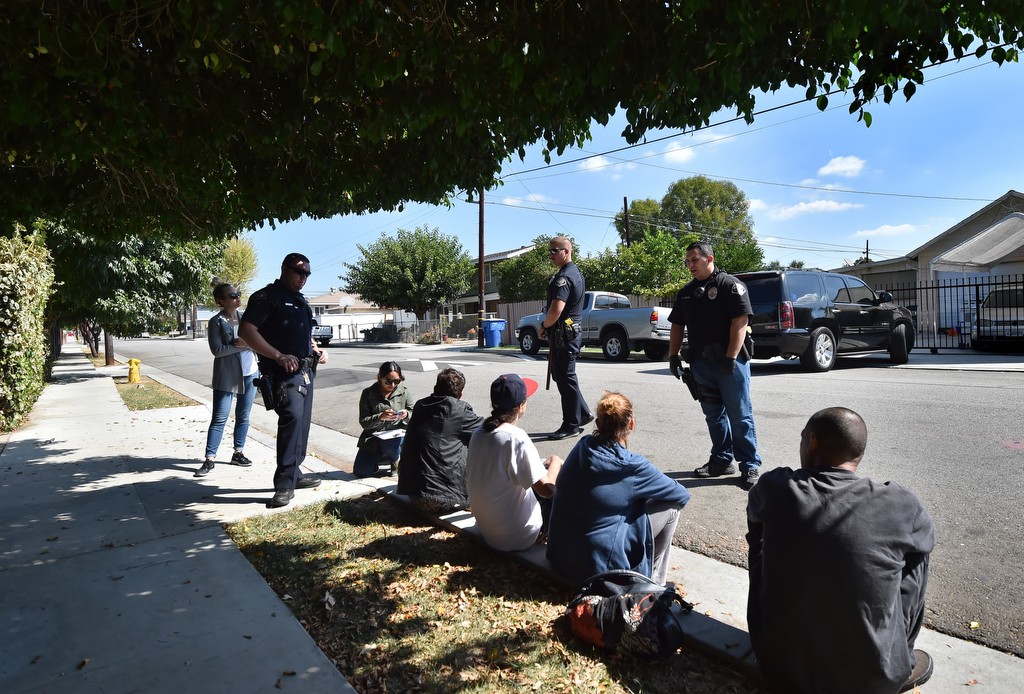People rarely call because they live hidden from view.
Built into the chalky dirt wall of a storm drainage canal, a five minute walk away from La Habra Boulevard, is where they have built a home concealed by pine trees.
Broken concrete stacked together creates a stairway to a two-bedroom refuge where Dave lives with his girlfriend and sometimes others who need shelter.
Clothes lines draped with sheets cordon off bedrooms and solar lamps dangle from wiring hung from nearby trees.
Half-empty jugs of water and soda collect at the bottom of the stacked concrete. Shopping carts stuffed with items are lined up on a front patio of loose dirt and dried pine needles.
“Sorry for the mess,” said Dave, referring to the strewn pieces of unwrapped American cheese littered on the stairway. “The basket dumped over and I haven’t had a chance to clean it.”
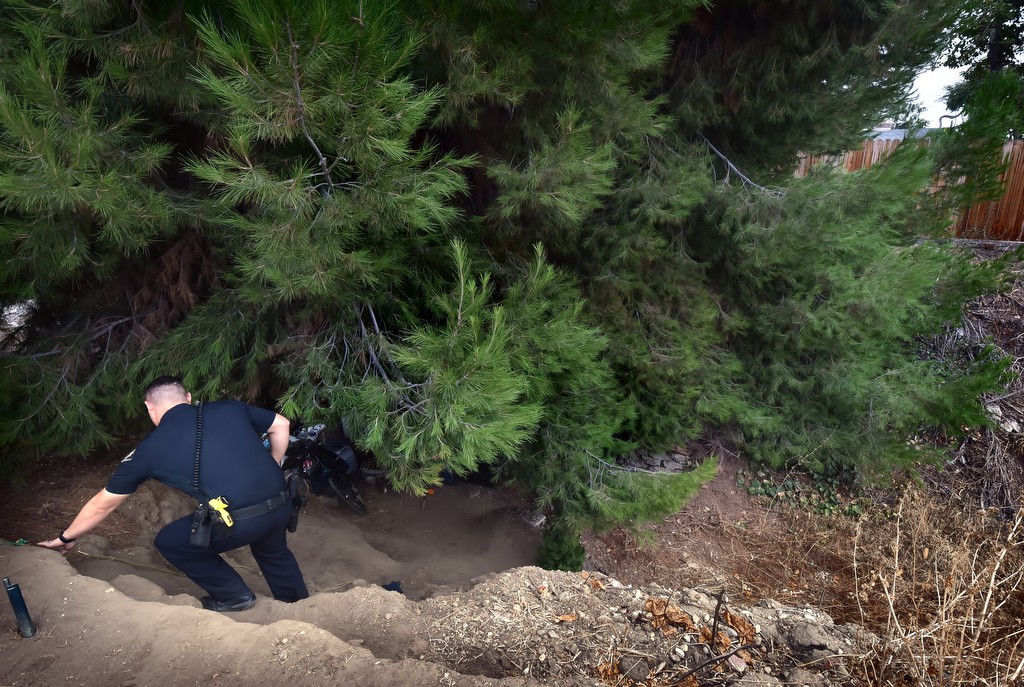
La Habra PD Officer Justin Braasch walks down a hill to check-in on a homeless couple living under a tree in a flood canal.
Photo by Steven Georges/Behind the Badge OC
His visitors don’t care about the dumped basket. They just want to help.
La Habra police, in partnership with the homeless collaborative City Net, wants to provide a long-term solution for the city’s homeless — an effort that takes much coordination, resources and patience.
“This is everyone working together with a shared goal of helping people get off the streets,” said Gigi Zanganeh, program director for City Net. “It takes an army to help one person. At a minimum, it takes four agencies to help a person get off the streets.”
City Net currently works with law enforcement in four other Orange County cities — Anaheim, Buena Park, Santa Ana and Stanton.
The agency collaborates with more than 120 agencies, including churches, non-profits and businesses. They assist with job searches, filling out forms for benefits and placing people in permanent housing.
La Habra police estimate they have a population of about 50 homeless people living in the city every day, although the number likely fluctuates.
Officers said they field multiple phone calls a day complaining about the homeless.
“We get calls about people sleeping in front of a business, a disturbance or theft,” said Officer Daniel Uberin, one of the department’s homeless liaison officers. “This program is giving the homeless a better option.”
In the past, police relied on enforcement to address any issues with the homeless population, but it was only a short-term solution.
They now have added a robust advocacy campaign to their already-established enforcement efforts, hoping to effect real change.
The department developed a homeless liaison team of four officers, and in May partnered with City Net. The team goes out twice a month to meet and talk with the city’s homeless.
“We don’t force anyone to talk to us, but they will eventually” Uberin said. “It’s almost impossible to be homeless and not commit some type of crime whether it be panhandling, theft, causing a disturbance, or something like that.”

La Habra PD Officer Daniel Uberin of the homeless outreach program talks to a homeless man who had been assaulted by a man in a neighboring apartment complex.
Photo by Steven Georges/Behind the Badge OC
Many of the homeless the team encountered on a recent Wednesday, including Dave, who lives in the drainage canal, have had some trouble with the law.
“I went to prison and lost everything,” Dave told the team. “It’s easy to get on the streets, but it’s really hard to get off. It’s my fault. I take full responsibility.”
Dave talked about how he couldn’t work because of an injury and his fear of staying on the street for much longer.
Tyler Ahtonen, a case manager for City Net, tried to gently persuade Dave and his girlfriend to accept help.
“You know this isn’t a life sentence for you guys,” he told them.
Dave agreed and said this time he would take advantage of the assistance being offered.
But the team has heard that before. They have been trying to help Dave for many weeks.
“The rainy season is coming and this is not a safe place for them,” said Officer Justin Braasch, another La Habra homeless liaison officer. “But you have to want help to get help.”
Added Zanganeh: “Half the battle is getting them to show up to appointments we’ve set up, but we don’t give up on anyone.”

Marissa Uribe, intern (Cal State Fullerton) for City Net talks to a women during a homeless outreach visit.
Photo by Steven Georges/Behind the Badge OC
Getting someone off the street can take weeks of counseling. In one case in another city, the process took two years, Zanganeh said.
During their bi-monthly outing, the La Habra PD and City Net team checked the usual places — behind shopping centers, in storm drainage canals and some private properties.
“Sometimes business owners think they’re being nice by allowing the homeless to live on their properties, but it’s really not helping anyone,” Zanganeh said.
James and Opal make their home of draped bed sheets and sleeping bags at the back of an auto repair shop.
They recently learned how dangerous their lifestyle can be.
A disgruntled neighbor, upset that the couple lives where he can see then from his apartment in the complex next door threatened the couple with a gun, pistol whipped James and fired off a round in their direction.
Police said the man told officers he accidentally discharged the gun as he was putting the firearm back into his waistband. His intent was to scare them off the property, he told police.
Officers quickly responded and arrested the suspect, who currently is in jail.
James and Opal now say they are ready to accept help from the La Habra PD Homeless Outreach Program.
“This should be an eye opener for you guys that the streets are a dangerous place,” Officer Kevin Love, told them. Love is also a liaison officer who has been working with the couple.
James agreed and thanked Love and the rest of the team for coming by.
The rest of the morning went along in a similar way.
The team would find someone homeless, counsel them and offer support.
Everyone the team encountered had different stories and different demons they battle, from addiction to mental health issues.
One man in a wheelchair with a self-admitted alcohol problem vented about his difficulty finding a shelter because he is disabled. He said he was afraid he wouldn’t make it through the winter if he didn’t find shelter.
Then there was a young woman with her dog panhandling outside a store. She didn’t want the help, and said she was on her way to help another homeless friend move locations.
Another young man, who was found sleeping on a rug in the dirt in a known encampment, said he wanted help. He previously worked as a line cook at an Orange County restaurant, but lost his job.
“This is very complex because everyone is different and has different needs,” Zanganeh said. “We are reaching the hardest to find, but the hardest to serve, too. But as long as people need assistance, we’re going to try and help them.”
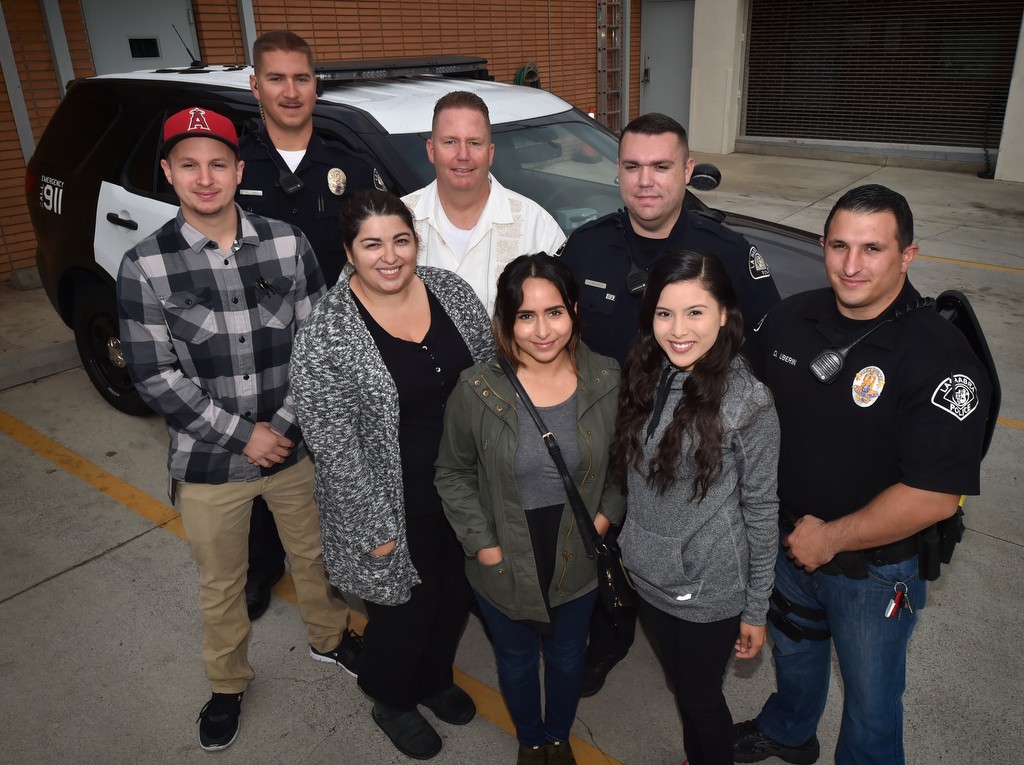
La Habra PD’s homeless outreach program members are from left, Tyler Ahtonen, lead case manager, left, La Habra PD Officer Kevin. Love, Gigi Zanganeh, director of programs for City Net Homeless Outreach, Lt. Dan Henderson, police supervisor of the outreach program, La Habra PD Officer Justin Braasch, Marissa Uribe, (Cal State Fullerton) intern for City Net, and La Habra PD Officer Daniel Uberin.
Photo by Steven Georges/Behind the Badge OC
 Behind the Badge
Behind the Badge
